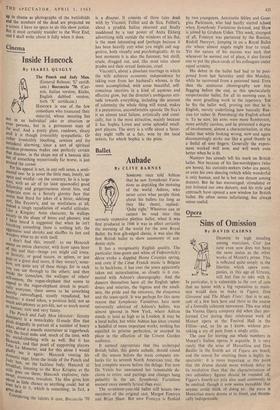Cinema
By ISABEL QU1GLY
Inside Hancock
HANCOCK is one of the few comedians who transcend their material, whose meaning lies not in an individual joke or situation or even persona, but in a permanent state of the soul. And a pretty glum, rundown, sleazy soul it is though irresistibly sympathetic. Or rather irresistibly touching, anxious and (to °Insiders) alarming, since a sort of spiritual aecident-proneness makes one perfectly certain that disaster, in the shape not of a banana skin but of something mysteriously far worse, is just around the corner. Yet his appeal is not, in any soft sense, a senti- mental one: he is never the little man, lonely, sat uPon and wistful—on the contrary, he is a large Irian, with an air of (at least spasmodic) good fellowship and gregariousness about him, and desperate eyes in a fiercely gloomy face that seems best fitted for jokes of a bitter, sidelong sort, like Eeyore's; and no wistfulness at all, i„Ildeed a tough repudiation of wistful attitudes. Like a Kingsley Amis character, he wallops society in the shape of bores and phonies; and I have heard it suggested that when he isn't knftking something there is nothing left, the aggressive soul shrinks and shuffles its feet and Wonders what to do with itself. don't find this, myself: to me Hancock seems an onion character, with layer upon layer ur this and that—things you might call irony, or ferocity, or good nature, or spleen, or just i!_ags or a great deal more, if they weren't, some- nft, not quite any of these things, for in each Ye'n can see through to the others; and then Inside the iconoclast, the walloper of others' self-esteem, the rogue-elephant that seems to appeal to the rogue-elephant streak in practi- cally everyone, there seems to be something heavily camouflaged, stoutly repudiated, but "skive: a stand taken, a position had, not so as anti-phoney as pro-life, not so much moral 48 human; rich and very funny. s rile Punch and Judy Man (director: Jeremy .11intners) is a remarkably ill-made film that p.ods doggedly in pursuit of a number of hoary
Joies, about a seaside entertainer at loggerheads with k
the local nobs and, much of the time, with Tp social-climbing wife as well. But it has ucK, and that pearl of supporting players .‘.,von Le Mesurier, and for this alone I would .1a(11Y 'see it again: Hancock venting his domestic rage, from the inside of the Punch and bruY box, on the luckless Judy; Hancock at eyakfast, listening to the Rice Krispies as the milk geleS on them; Hancock explosive, rain- Swept, ePt, overeaten, truculent. The film gives him 7.Ootit as little chance as anything could, but at least he's in it, which is something; in fact, a great deal. Considering the talents it uses, Boccaccio '70
is a disaster. It consists of three tales dealt with by Visconti, Fellini and de Sica. Fellini's, about a prudish Italian obsessed and finally maddened by a vast poster of Anita Ekberg advertising milk outside the windows of his flat, is the most interesting and (perhaps because it has been heavily cut) what you might call sug- gestive, both visually and psychologically. At its best moments it is also the funniest; but shrill, crude, dragged out, and, like most tales about prudes and their sexual fantasies, cruel. Visconti's, about a dissolute marriage in which the wife achieves economic independence by taking over from her husband's whores, is the most accomplished, with some beautiful, self- conscious interiors in a kind of aqueous and effective glow, but the director's ambiguous atti- tude towards everything, including the amount of solemnity the whole thing will stand, makes it a pretentious, uncomfortable episode. De Sica's is an almost total failure, artistically and comi- cally, but is the most attractive, mainly because it has Sophia Loren and some splendid small- part players. The story is a trifle about a Satur- day night raffle at a fair, won by the local sexton, for which Sophia is the prize.


































 Previous page
Previous page